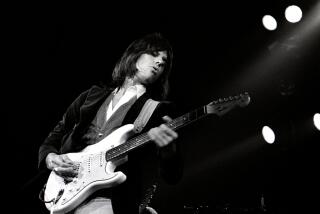JAZZ REVIEW : Corea, Hancock Together--Each in Own Key
- Share via
The jazz careers of Chick Corea and Herbie Hancock have followed such similar courses over the last two decades that a duo concert by the pair almost seems like a redundancy. The key difference, as their program at the Greek Theatre on Wednesday night clearly illustrated, is in their interpretation of the word jazz .
Corea’s music has grown in an evolutionary fashion, moving smoothly from the contemporary bop of his early career to the high-energy, eclectic fusion of his current Elektric Band. But it has never strayed far from the elemental aspects of jazz improvisation.
The rhythm section of the group--Corea, with Dave Weckl on drums and the redoubtable John Patitucci on bass--has been working as a unit for more than two years. On Wednesday night, the rich ferment of that togetherness produced one startingly creative moment after another. The middle section of a new Corea arrangement of “Spain,” for example, featured Corea and Patitucci on acoustic instruments in a passionately interactive sequence that was pure musical magic.
Saxophonist Eric Marienthal and guitarist Frank Gambale, more recent arrivals with the Elektric Band, played well, especially on “Light Years,” “Forgotten Past” and “Passage” (the latter two titles from Corea’s new GRP album, “Eye of the Beholder”), but their final integration into the heart and soul of the ensemble seemed to still be a few heartbeats away.
Hancock’s current band, Headhunters II--a revival of an earlier identity--reflected his considerably broader interpretation of jazz.
Most of his set was dominated by the steaming funk rhythms of drummer Charlie Drayton, bassist Darryl Jones and percussionist Steve Thornton. Saxophonist Michael Brecker added a few bright moments (especially when he was exploring the multiplicity of sounds in his new EWI (Electronic Wind Instrument), and Hancock was unexpectedly lyrical in a solo reading of his original ballad, “Chan’s Song” (from the “ ‘Round Midnight” score).
But one sensed that this time around, Hancock’s primary concern was the presentation of music that would support his pop-oriented new CBS album, “Perfect Machine,” and the jazz content of his program was directly affected--in this case adversely--by that desire.
More to Read
The biggest entertainment stories
Get our big stories about Hollywood, film, television, music, arts, culture and more right in your inbox as soon as they publish.
You may occasionally receive promotional content from the Los Angeles Times.










